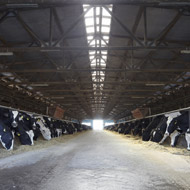RUMA defends veterinary use of antibiotics

It's critical that potential impacts on welfare, food safety, product quality and investment are fully understood by the businesses involved.
Non-profit group RUMA has defended the use of antibiotics in farming, after recent reports that a group of investors contacted food companies, urging them to 'stop their meat and poultry suppliers using antibiotics vital for human health'.
RUMA (Responsible Use of Medicines in Agriculture Alliance), said that whilst it welcomes food companies and suppliers working together to reduce the need for antibiotics in farm animals, it is vital that the potential impacts are understood.
'The concept that food companies work sustainably with their supply chains to reduce the need for antibiotics is welcomed by RUMA; this is already happening.
'However, it's critical that potential impacts on welfare, food safety, product quality and investment are fully understood by the businesses involved, so that farmers have the confidence, means and support to make any necessary changes.'
Equally, the group said it is important the issue is not exploited as a 'marketing tool'.
'There is a risk that misrepresentation of the facts and a failure to appreciate the situation in different countries could end up harming welfare, cause unnecessary suffering and lead to significant losses in our farm livestock sector.'
It is reported that 70 per cent of antibiotics in the US may be used to tackle disease challenges, whereas in the UK the figure is only 40 per cent. Public Health England figures show that the medical use of antibiotics is in fact 2.4 times higher than that of veterinary.
'Furthermore, use of antibiotics as growth promotors has been banned in the EU since 2006; antibiotics are only available in the UK on prescription from vets; and the industry has already opted for restrictions to use a number of antibiotics classed as critically important for human health, such as third and fourth generation cephalosporins, fluoroquinolones and colistin, only when truly necessary.'



 The latest
The latest